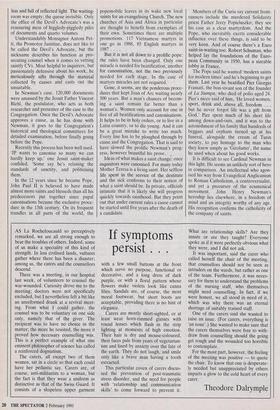If symptoms
persist . . .
AS La Rochefoucauld so perceptively remarked, we are all strong enough to bear the troubles of others. Indeed, some of us make a speciality of this kind of strength. In less civilised lands, vultures gather where there has been a disaster; among us, the carers and the counsellors descend.
There was a meeting, in our hospital last week, of volunteers to counsel the war-wounded. Curiosity drove me to the meeting; doctors were not specifically excluded, but I nevertheless felt a bit like an unreformed drunk at a revival meet- ing. From what I could gather, the counsel was to be voluntary on one side only, namely that of the giver. The recipient was to have no choice in the matter; the more he resisted, the more it proved how necessary counselling was. This is a perfect example of what one eminent philosopher of science has called a reinforced dogmatism.
The carers, all except two of them women, sat in a circle so that each could have her pedantic say. Carers are, of course, anti-militarists to a woman, but the fact is that they wear a uniform as distinctive as that of the Swiss Guard. It consists of a shapeless upper garment with a few small buttons at the front which serve no purpose, functional or decorative, and a long dress of dark purple, or with a floral pattern whose flowers make violets look like canna lilies. Sandals are, of course, the most moral footwear, but short boots are acceptable, providing there is no hint of elegance.
Carers are mostly short-sighted, or at least wear horn-rimmed glasses with round lenses which flash in the strip lighting at moments of high emotion. Their hair is dry and mouse-coloured, their faces pale from years of vegetarian- ism and lined by anxiety over the fate of the earth, They do not laugh, and smile only like a brave man having a tooth extracted.
This particular coven of carers discus- sed the prevention of post-traumatic stress disorder, and the need for people with 'relationship and communication skills' to come forward to prevent it. What are relationship skills? Are they innate or are they taught? Everyone spoke as if it were perfectly obvious what they were, and I did not ask.
It was important, said the carer who called herself the chair of the meeting, that counsellors should not be seen as intruders on the wards, but rather as one of the team. Furthermore, it was neces- sary for them to understand the problems of the nursing staff, who themselves might need counselling. In fact, if we were honest, we all stood in need of it, which was why there was an eternal shortage of suitably trained staff.
One of the carers said she wanted to raise an issue. (For carers, everything is `an issue'.) She wanted to make sure that the carers themselves were free to with- draw from counselling should the going get rough and the wounded too horrible to contemplate.
For the most part, however, the feeling of the meeting was positive — to quote the chair. To know that one is desperate- ly needed but unappreciated by others imparts a glow to the cold heart of every carer.
Theodore Dalrymple


















































 Previous page
Previous page